

In this resource centre, we will focus on the changes in cognitive abilities and discuss how can older adults stay active to their maintain cognitive abilities.
Cognitive abilities refer to general mental capability that include reasoning, problem-solving, planning, abstract thinking and complex idea comprehension (ScienceDirect, n.d.). It is also related to memory, learning and problem-solving.
Cognitive Health and Older Adults. Cognitive health—the ability to clearly think, learn, and remember—is an important component of brain health.
The web page addresses how to maintain cognitive health through maintaining physical health, proper diets and engaging social activities. – klpeh005
Others include:
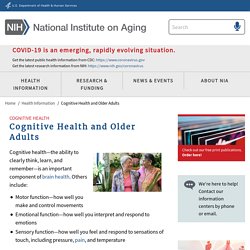
Cognitive Development in Late Adulthood. What you’ll learn to do: explain cognitive development in late adulthood There are numerous stereotypes regarding older adults as being forgetful and confused, but what does the research on memory and cognition in late adulthood actually reveal?
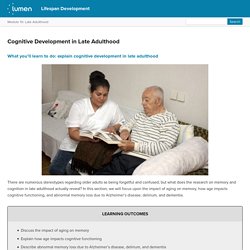
In this section, we will focus upon the impact of aging on memory, how age impacts cognitive functioning, and abnormal memory loss due to Alzheimer’s disease, delirium, and dementia. Memory and Aging Center. Some changes in the ability to think are considered a normal part of the aging process.
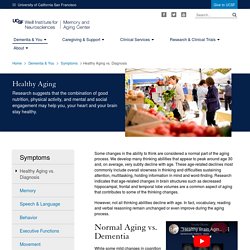
We develop many thinking abilities that appear to peak around age 30 and, on average, very subtly decline with age. These age-related declines most commonly include overall slowness in thinking and difficulties sustaining attention, multitasking, holding information in mind and word-finding. Research indicates that age-related changes in brain structures such as decreased hippocampal, frontal and temporal lobe volumes are a common aspect of aging that contributes to some of the thinking changes. However, not all thinking abilities decline with age. How memory and thinking ability change with age.
Scientists used to think that brain connections developed at a rapid pace in the first few years of life, until you reached your mental peak in your early 20s.
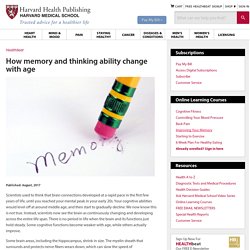
Your cognitive abilities would level off at around middle age, and then start to gradually decline. We now know this is not true. Instead, scientists now see the brain as continuously changing and developing across the entire life span. The amazing fertility of the older mind - BBC Future. If you ever fear that you are already too old to learn a new skill, remember Priscilla Sitienei, a midwife from Ndalat in rural Kenya.
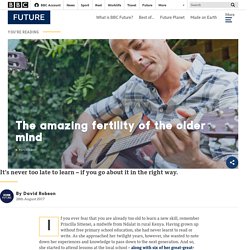
Having grown up without free primary school education, she had never learnt to read or write. As she approached her twilight years, however, she wanted to note down her experiences and knowledge to pass down to the next generation. And so, she started to attend lessons at the local school – along with six of her great-great-grandchildren. She was 90 at the time. We are often told that “you can’t teach an old dog new tricks” – that the grizzled adult brain simply can’t absorb as much information as an impressionable young child’s. The latest studies from psychology and neuroscience show that these extraordinary achievements need not be the exception. Adult Learners: Effects of Age on Cognitive Ability and Memory Retention. June 05, 2018 - Gini Beqiri - 14 min read When teaching adults, it's important to take into account characteristics that affect their learning, especially how previous experiences influence their thinking.
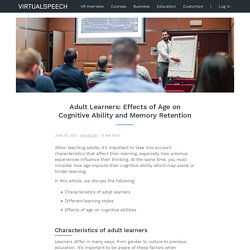
At the same time, you must consider how age impacts their cognitive ability which may assist or hinder learning. In this article, we discuss the following: Characteristics of adult learners Different learning styles Effects of age on cognitive abilities Characteristics of adult learners. Memory and Aging. Fundamental insight into how memory changes with age. New research from King's College London and The Open University could help explain why memory in old age is much less flexible than in young adulthood.
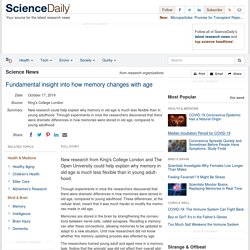
Through experiments in mice the researchers discovered that there were dramatic differences in how memories were stored in old age, compared to young adulthood. These differences, at the cellular level, meant that it was much harder to modify the memories made in old age. Memories are stored in the brain by strengthening the connections between nerve cells, called synapses. Age Differences in Everyday Problem-Solving Effectiveness: Older Adults Select More Effective Strategies for Interpersonal Problems. We use cookies to enhance your experience on our website.
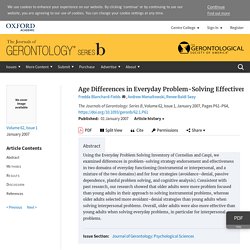
By clicking 'continue' or by continuing to use our website, you are agreeing to our use of cookies. You can change your cookie settings at any time. We use cookies to enhance your experience on our website.By continuing to use our website, you are agreeing to our use of cookies. You can change your cookie settings at any time. <a href=" Find out more</a> The role of cognitive abilities in decisions from experience: Age differences emerge as a function of choice set size. The Best Ways to Keep Your Mind Young. Before you explore this section... 6 simple steps to keep your mind sharp at any age. Everyone has the occasional "senior moment.
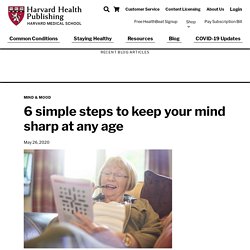
" Maybe you've gone into the kitchen and can't remember why or can't recall a familiar name during a conversation. Memory lapses can occur at any age, but aging alone is generally not a cause of cognitive decline. When significant memory loss occurs among older people, it is generally not due to aging but to organic disorders, brain injury, or neurological illness.
Studies have shown that you can help prevent cognitive decline and reduce the risk of dementia with some basic good health habits: staying physically active getting enough sleep not smoking having good social connections limiting alcohol to one drink a day eating a balanced diet low in saturated and trans fats. Diet and Exercise Might Reverse Aging in the Brain. A sharper mind: tai chi can improve cognitive function. There are lots of jokes about forgetting where you put your keys, but as you get older, changes in your mental function are no laughing matter.
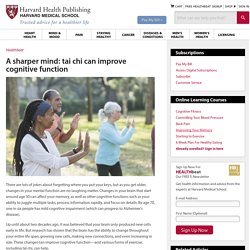
Changes in your brain that start around age 50 can affect your memory, as well as other cognitive functions such as your ability to juggle multiple tasks, process information rapidly, and focus on details. By age 70, one in six people has mild cognitive impairment (which can progress to Alzheimer's disease). Up until about two decades ago, it was believed that your brain only produced new cells early in life.
Untitled. Physical Activity and Older Adults. Before you explore in this section... Cognitive stimulation activities for elderly, seniors & adults. What is cognitive stimulation? Cognitive stimulation refers to a set of techniques and strategies that are directed to improve performance and efficacy of cognitive capabilities and executive functions such as working memory, attention, language, reasoning and planning, among others. More concretely, cognitive stimulation is oriented towards the improvement of cognitive functionality. The preserved cognitive capabilities and abilities are stimulated and trained through the potentiation of neuroplasticity, which is understood as the capability of the nervous system to change its structure and functionality throughout the course of life, as reaction and adaptation to the diversity of the surroundings.
Brain Games for Seniors: 25 Fun Ways to Keep Your Mind Sharp. Researchers continue to believe that playing what they call “brain training games” can help keep the mind sharp. They may not prevent a brain from normal aging, but they can help keep a brain healthy, alert and finely tuned. These mentally stimulating games can play an important role in aging well.
Mentally challenging brain games -- cards, puzzles and board games -- are good for seniors who may have mobility issues because they don’t involve a lot of physical activity. What they do involve are fun, intellectual and social forms of stimulation. The thinking on brain games. 12 ways to keep your brain young. Every brain changes with age, and mental function changes along with it. Mental decline is common, and it's one of the most feared consequences of aging. But cognitive impairment is not inevitable. Here are 12 ways you can help maintain brain function. 1. Get mental stimulation Through research with mice and humans, scientists have found that brainy activities stimulate new connections between nerve cells and may even help the brain generate new cells, developing neurological "plasticity" and building up a functional reserve that provides a hedge against future cell loss.
Any mentally stimulating activity should help to build up your brain. 2. Research shows that using your muscles also helps your mind. 3. Before you explore this section... Friends (and Sometimes Enemies) With Cognitive Benefits: What Types of Social Interactions Boost Executive Functioning? Corresponding Author: Oscar Ybarra, University of Michigan, 3006 East Hall, 530 Church Street, Ann Arbor, MI 48109 Email: oybarra@umich.edu Oscar Ybarra is professor of psychology at the University of Michigan. Cognitive Benefits of Online Social Networking for Healthy Older Adults. We use cookies to enhance your experience on our website.By continuing to use our website, you are agreeing to our use of cookies. You can change your cookie settings at any time. <a href=" Find out more</a> Skip to Main Content Search Close Advanced Search Search Menu Article Navigation Volume 72 Issue 5 September 2017 Article Contents. Cognitive Effects of Social Media Use: A Case of Older Adults.
The social implications of social media have fascinated researchers for some time. Social and Emotional Aging. Summary of Journal Articles. Exploring Interventions to Reduce Cognitive Decline in Aging. The Impact of Age on Cognition. Physical activity to improve cognition in older adults: can physical activity programs enriched with cognitive challenges enhance the effects? A systematic review and meta-analysis. Does physical exercise improve perceptual skills and visuospatial attention in older adults? A review. Individualized Piano Instruction enhances executive functioning and working memory in older adults: Aging & Mental Health: Vol 11, No 4. References.